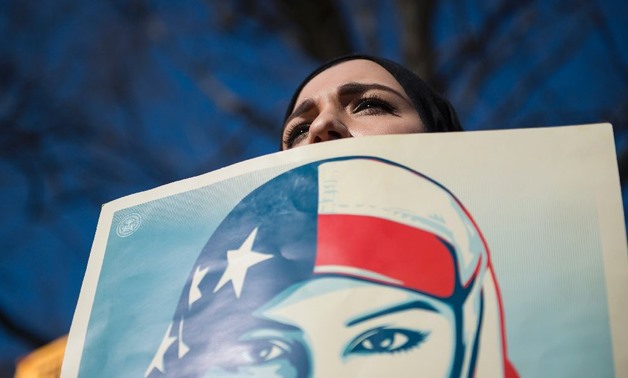
Donald Trump issued an initial travel ban by executive order in January - AFP/Molly RILEY
Los Angeles (AFP) - A US appeals court has upheld a decision to block President Donald Trump's controversial travel ban targeting citizens from six Muslim majority nations - the latest in a string of stinging judicial blows for the Republican billionaire.
The US Court of Appeals for the Ninth Circuit on Monday kept in place a lower court injunction on the ban, arguing the president had overstepped his authority and his executive order discriminated against travelers based on their nationality.
The matter was already headed for the Supreme Court, as another federal appeals court had already ruled against the Republican president, and the Justice Department had asked the high court to hear the case.
But the Ninth Circuit ruling certainly was another setback for Trump in his quest to see the measure put into effect.
"Immigration, even for the president, is not a one-person show," the three justices -- all appointed by former president Bill Clinton -- said in their unanimous ruling.
"The president, in issuing the executive order, exceeded the scope of the authority delegated to him by Congress."
The judges said the government had failed to prove "any link between an individual's nationality and their propensity to commit terrorism," and cited a June 5 tweet by Trump to back their argument.
"Indeed, the president recently confirmed his assessment that it is the 'countries' that are inherently dangerous, rather than the 180 million individual nationals of those countries who are barred from entry under the president's 'travel ban,'" the judges wrote.
"National security is not a 'talismanic incantation' that, once invoked, can support any and all exercise of executive power," they added.
- Checks and balances -
The judges ruled against Trump on both the effort to bar from US entry travelers from Iran, Libya, Somalia, Sudan, Syria and Yemen for 90 days, and on the clause suspending the refugee program for 120 days.
That went one step farther than the Fourth Circuit Court of Appeals, which only upheld the part of the measure naming the specific countries.
The judges did appear to back the administration in saying that the government was within its rights to review existing vetting procedures for travelers from the six countries concerned.
Douglas Chin, the attorney general for Hawaii, one of the states challenging the executive order, said the ruling was a clear message to the administration that it was not above the law.
"I stated from the beginning that the president must act in a way that follows the laws and constitution of the United States," Chin said in a statement.
"Our system of checks and balances, enshrined in the Constitution for more than 225 years, remains in place."
- Heading to the Supreme Court -
The ruling came just ahead of a deadline for states challenging the travel ban to submit briefs to the Supreme Court in response to the Trump administration's request that the nine justices hear the case.
The US Justice Department filed an emergency application to the Supreme Court on June 1, urging it to undo the Fourth Circuit's ruling.
Trump issued an initial travel ban by executive order in January, but that measure -- which banned entry to nationals from seven countries for 90 days and suspended the nation's refugee program for 120 days -- was quickly halted by the courts.
A revised executive order announced in March -- meant to address the issues raised by the federal judges -- deleted Iraq from the list and removed an indefinite ban on Syrian refugees. This is the measure affected by the Ninth Circuit ruling.
The Trump administration argues the measures are needed to ward off terror attacks in the country, but critics say the ban is discriminatory and violates the US constitution by specifically targeting Muslim-majority countries.
The Justice Department declined to comment on the latest ruling.
- No justification for ban -
In refusing to reinstate the travel ban, the Ninth judges said there was no evidence presented by the Trump administration to back the measure -- and pointed to a government report to support their decision.
The Department of Homeland Security report -- issued just after Trump's first executive order -- concluded that citizenship of any given country "is unlikely to be a reliable indicator of potential terrorist activity" and that citizens from the countries targeted by Trump's ban are "rarely implicated in US-based terrorism."
Jessica Levinson, a law professor at Loyola Law School in Los Angeles, said Monday's ruling was yet another signal that Trump's executive order was on weak legal footing.
"At this point, it's surprising if a court rules in favor of the travel ban," Levinson told AFP.
She said she did not expect the Supreme Court to consider the case before the fall, making it difficult for the administration to defend its argument that the travel ban was urgently needed.
"The longer it goes on, in a way the worse it is for the Trump administration because they claimed they needed this right away for national security," she said.
"It's harder to argue that time is of the essence when so much time goes by."

Comments
Leave a Comment